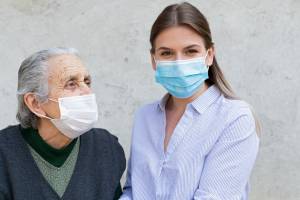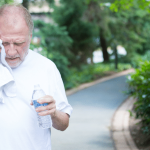
Allergies are no fun! They’re uncomfortable, frustrating, and can be a serious risk for people who suffer from them on a seasonal basis – especially seniors. Fall and spring are the two seasons where allergies happen the most often, that is why both caregivers and seniors need to watch out for the allergens.
Seniors who suffer from chronic medical conditions, especially heart-related issues, are at a significant risk for health issues that can be brought on by an allergic attack. Continue reading for more information on fall allergies and how seniors can minimize their negative effects.
Common Fall Allergy Symptoms
Here are some of the most common symptoms that seniors suffer from when they come into contact with autumnal allergens:
- Stuffy or runny nose
- Sore or scratchy throat
- Sneezing or wheezing
- Skin rash
- Cough and sore throat
- Aches or pains on the body
- Itchy and watery eyes, reminiscent of pink eye
- In particularly bad cases, a high fever
Be on the lookout for any and all of the above symptoms. If one of these symptoms becomes severe and really begins to become uncomfortable for the suffering senior, contact a medical professional immediately.
Common Fall Allergens
All seasons have some specific allergens that appear during that particular season. Here are some of the most common allergens that appear during the fall months:
- Various Molds – Everyone knows that during the fall, the leaves fall off the trees. Many times, the fallen leaves sit for long periods of time, becoming damp. That moisture from the dampness causes mold to collect on the surfaces of the leaves. The heavy winds associated with the fall season then blow the mold off the leaves and into the air we breathe, which can cause symptoms such as skin rash and sore throat.
- Ragweed – Ragweed, which blooms in August and continues through October, is a plant that produces a pollen which can be irritating to seniors. Ragweed pollen symptoms include itchy eyes and sneezing or coughing.
- Dust Mites – Dust mites are microscopic bugs that inhabit indoor areas during the summer months. They become an issue when you turn your heaters on during the colder months and they get blown into the air, which is then inhaled. Symptoms of dust mites are similar to ragweed pollen symptoms.
 Managing Allergies and Protecting Seniors
Managing Allergies and Protecting Seniors
While allergies during the fall season are inevitable, there are ways to manage them and mitigate their consequences for seniors. A big part of senior care and elderly care is knowing how to combat these allergies in order to keep them safe. Here are some common strategies to manage allergy symptoms and protect seniors:
- Understand the Symptoms – Knowing what the fall allergy symptoms are and how to combat them is half the battle. Be on the lookout for symptoms laid out above, especially when seniors are outdoors.
- Seek Medical Assistance – If the symptoms persist even after utilizing generic over-the-counter medicines, inform the senior’s doctor. Schedule an appointment with a doctor for a more accurate diagnosis of the problem.
- Clean, Clean, Clean – Before the fall season begins, it’s always a good idea to give the senior’s home a thorough cleaning. Vacuum and dust your home before the onset of fall allergens and continue to do so during the entire fall season.
- Close the Windows – A cool breeze is always nice for a breath of fresh air, but for the sake of avoiding allergies, seniors should make a concerted effort to keep their windows closed during the fall season.
- Make Dietary Adjustments – Encourage seniors to eat foods that contain anti-inflammatory properties. Foods like nuts, leafy greens, and fruits such as blueberries and cherries have anti-inflammatory properties that help fight off negative side effects of fall allergies.
- Wash Regularly – If a senior has spent an extended period of time outdoors, make sure they wash their hands and shower as soon as possible. Pollen can stick to the hands and body which can lead to the onset of allergic symptoms. It’s also a good idea that seniors wash their outdoor clothes regularly during the fall season, as pollen particles stick to clothing material as well.
- Check the Weather & the Pollen Count – It’s always a good idea to check the weather report for weather that’s conducive to allergy breakouts. If the weather is calling for heavy winds, try to avoid the outdoors. Likewise, check the local pollen count to see if there are certain areas that have particularly high counts.
- Utilize Over-the-Counter Medicines – Generic meds such as nasal sprays and saline sprays can help alleviate bad allergic symptoms and make seniors feel more comfortable.
Schedule a Free Consultation
 Keeping our seniors protected and in a safe environment is paramount. If you live in the Chicagoland area and require the services of a reliable elderly care service, give Assisting Hands Home Care a call today. We offer a variety of services for elderly home care, and we make the comfort and happiness of your senior loved ones our number one priority.
Keeping our seniors protected and in a safe environment is paramount. If you live in the Chicagoland area and require the services of a reliable elderly care service, give Assisting Hands Home Care a call today. We offer a variety of services for elderly home care, and we make the comfort and happiness of your senior loved ones our number one priority.
For more information regarding our personal home care assistance services in the Park Ridge, IL area, contact Assisting Hands Home Care at (847) 796-6685.




